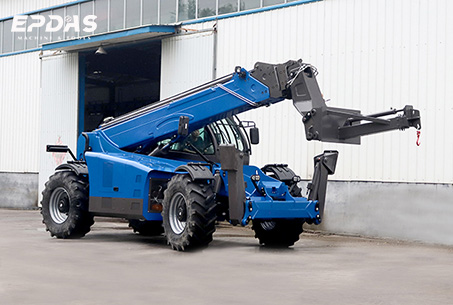The future of construction is increasingly automated, with technology playing a larger role in everything from design to execution. Telehandlers, or telescopic handlers, are a prime example of this trend, combining power and precision in a way that traditional construction equipment cannot match. Their versatility and advanced technology make them indispensable in modern construction.
The Evolution of Telehandlers
Telehandlers were first introduced in the 1970s as an all-in-one solution for lifting and transporting materials. Unlike forklifts, they offered a telescoping boom that could extend and retract, providing greater reach and flexibility. Over time, technological advancements such as hydraulic systems and automated controls have further enhanced their capabilities, allowing them to handle more complex tasks with greater efficiency.
Technological Integration in Telehandlers
Today’s telehandlers are equipped with sophisticated sensors and control systems that increase accuracy, safety, and efficiency.
Sensors and Automation
Modern telehandlers feature sensors that monitor the machine’s load, stability, and surroundings. These sensors help operators avoid collisions and ensure the machine is not overloaded, increasing both safety and operational efficiency. Automated systems adjust the boom’s position based on the load’s weight, height, and reach, allowing for smoother operation, even in confined spaces.
Smart Features and Connectivity
Telehandlers are becoming increasingly connected, with telematics and IoT technology enabling remote monitoring of the machine’s performance. This connectivity allows for real-time tracking, diagnostic tools, and predictive maintenance, reducing downtime and improving productivity on the job site.
Applications in Modern Construction
Telehandlers are used in various tasks, from material handling and lifting to more specialized functions like landscaping and site preparation. Their ability to lift heavy loads and reach high places, combined with their agility in tight spaces, makes them essential on construction sites where space is limited.
Material Handling and Lifting
Telehandlers are ideal for moving heavy materials like concrete, steel, and machinery around construction sites. The extended reach of the telescopic boom allows them to lift materials onto higher floors of buildings or place items in difficult-to-reach locations.
Precision in Tight Spaces
One of the key benefits of telehandlers is their ability to operate in confined spaces. Their articulated steering and compact design allow them to maneuver in tight areas, making them perfect for crowded construction sites.
Safety Features and Advancements
Safety is a top priority in construction, and telehandlers are designed with a variety of features to prevent accidents. Load-sensing systems automatically adjust the machine’s operation to prevent overloading, while proximity sensors and cameras help operators avoid obstacles. Additionally, telehandlers often include anti-roll-back technology and automatic leveling systems to ensure stability on uneven ground.
The Future of Telehandlers
As automation and AI continue to shape the future of construction, telehandlers will evolve to incorporate even more advanced features. Fully autonomous telehandlers, equipped with AI-driven systems and sensors, may soon become a reality. These machines would be capable of performing complex tasks with minimal human intervention, improving efficiency and reducing the potential for human error.
Sustainability and Efficiency
With sustainability at the forefront of the construction industry, telehandlers are becoming more energy-efficient. Electric and hybrid models are already in development, offering lower emissions and fuel consumption, which will be crucial as the industry works toward reducing its carbon footprint.
The future of telehandlers is bright, with technological advancements continuing to improve their functionality, efficiency, and safety. As the construction industry becomes more automated and sustainability-focused, telehandlers will play an increasingly important role, helping companies build more efficiently, safely, and sustainably.





